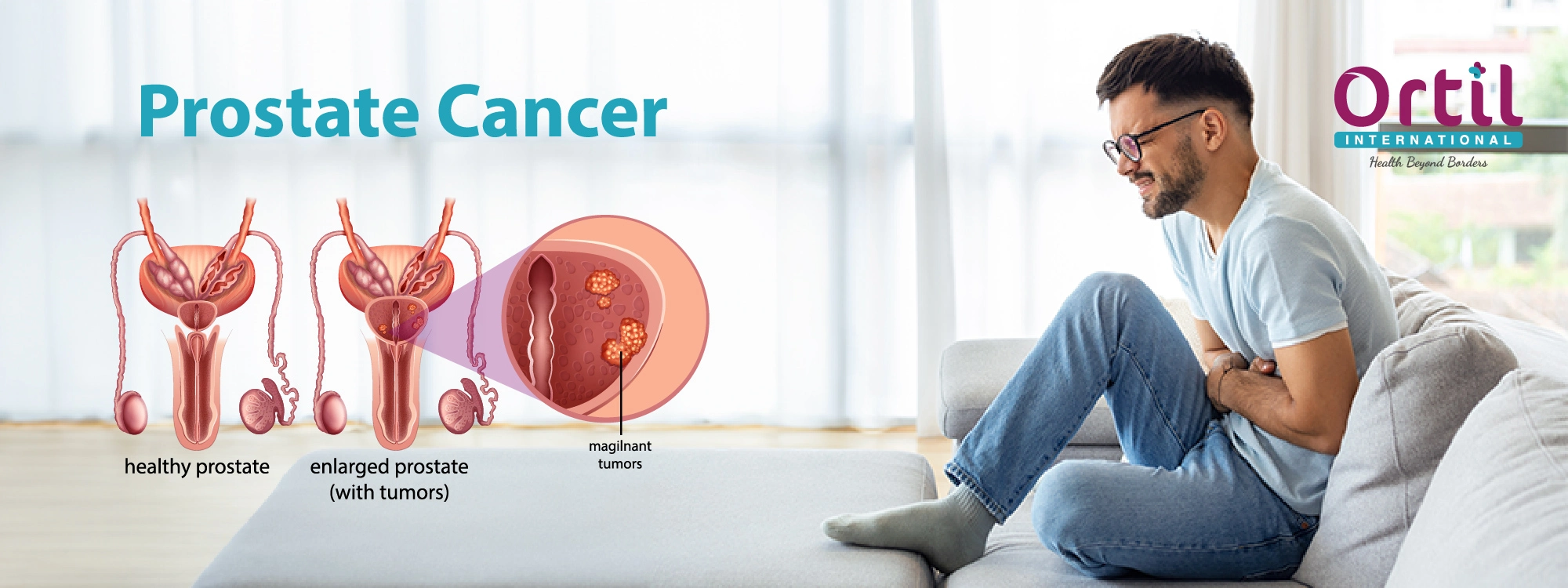Possible Complications of Advanced Prostate Cancer

When the prostate cancer develops to its end stage, and grows outside the prostate gland or returns after the treatment, it is termed as Advanced Prostate Cancer. In the advanced stage of prostate cancer, the complications are more severe and are very difficult to treat.
What are Some of the Complications for Prostate Cancer?
Advanced prostate cancer can cause several complications either due to the spread of cancer to other parts of the body or the effects of the cancer itself. Here are some common complications associated with advanced prostate cancer.
Erectile Dysfunction (ED)
Many of the men suffer from Erectile Dysfunction after they are diagnosed with prostate cancer. Erectile dysfunction is a condition when a man finds it hard to erect the penis during sexual intercourse.
What Causes Erectile Dysfunction?
Erectile dysfunction may be due to the change of blood supply to penis or it may be due to the damage of nerves that supply the muscles responsible for the erection. The damage to nerves or changes in blood supply can either be due to tumor location or it may be due to the effects of medications that damage the nerves or blood vessels.
Erectile dysfunction is mostly present in men who have cancer in their prostate, colon, urinary bladder and rectum. Treatments used to treat prostate cancer can also lead to erectile dysfunction and is also present in men who have a very high level of anxiety. The chances of developing the complication of erectile dysfunction may vary according to your age, type of treatment, sexual activity before cancer, and extent of damage to nerves and blood vessels.
Urinary Incontinence
The inability of the patient to control the flow of urine is called urinary incontinence. It is very common in the patients with prostate cancer. Urinary incontinence can cause severe complications because it not only affects the physical health of the patient but also causes severe mental health problems.
What causes Urinary Incontinence?
The location of the tumor can be the cause of urinary incontinence. Tumor may exert pressure on the prostate and urethra which in turn develops the incontinence. Incontinence can be due to external pressure placed on the bladder during coughing or sneezing which happens due to weakness of pelvic floor muscles. Or the urinary incontinence may be the result of damaging nerves which lose control of the urinary bladder.
It is very important to deal with urinary incontinence by using Kegel exercises and lifestyle changes.
Pain
Not all the men diagnosed with prostate cancer will experience the pain. Most men who have advanced prostate cancer are most likely to suffer from pain. Even the two individuals with the same stage of prostate cancer will experience the different types of pain at different times. Pain is more common in men who have prostate cancer that has spread to other parts of the body.
If you have been diagnosed with prostate cancer and are suffering from severe pain, you should ask your doctor for effective treatment of the pain.
What Causes Pain?
When the tumor spreads to the organs, muscles, bones and nerves and causes damage to these parts, it can cause severe pain.
Sometimes you may experience pain while receiving the treatment for prostate cancer itself. For example, radiotherapy and chemotherapy can irritate the nerves and structures of organs that can lead to severe pain.
You can experience Pain that can be due to the cause other than the prostate cancer like infection.
Weak Bones
Prostate cancer itself does not directly cause bone weakness. In the advanced prostate cancer, tumor cells can spread to the bones which is known as metastasis cancer. When prostate cancer spreads to the bones, it can weaken them and lead to complications like bone pain, fractures, and an increased risk of other deadly diseases of bones and muscles.
Bone cancer occurs when cancer cells from the prostate gland travel through the blood and settle in the bones. After reaching to bones, these cancer cells can damage the normal bone making process that ultimately leads to weakness of bones.
Eating and Digestion Problems
Prostate cancer does not directly cause digestion or eating disorders. But during the treatment of prostate cancer, many digestion problems appear as the side effects of the medications.
For example, if you are receiving the radiation therapy for prostate cancer you may experience diarrhea, nausea, vomiting, and changes in appetite. And during hormonal therapy, there may be the risk of developing digestion problems like weight gain, constipation, diarrhea and difficulty in controlling bowel movements.
What is the Link Between Prostate Cancer and Constipation?
In some rare cases, the advanced prostate cancer grows so large that it obstructs the structures present in the surroundings, including rectum. This may worsen the symptoms and make it complicated to treat the prostate cancer as well as constipation.
Infertility
After the treatments of prostate cancer, it may be difficult to have children. However, it can be managed with the expert’s recommendations.
After surgery, it is impossible to have children with sexual intercourse due to removal of seminal vesicles along with prostate gland that pass the sperms to outside the body.
Chemotherapy, radiation therapy and hormone therapy reduces the sperm count which makes it almost impossible to have children from a natural way.
Get Checked Regularly
Regular prostate checks are necessary for detecting prostate cancer at an early stage. It is more important in the older age. The prostate-specific antigen (PSA) blood test and the digital rectal examination (DRE) are two common methods used to screen for prostate cancer. However, it is very important to note that the prostate cancer screening schedule may vary depending on factors such as age, family history, and individual risk factors.
In general, men are advised to consider regular prostate screenings from the age of 50. However, if you have a family history of prostate cancer or other risk factors, your doctor may suggest starting screenings earlier, which is around the age of 45 or even before that.
Spread or Metastasis of Prostate Cancer
In advanced prostate cancer, it is possible that tumor cells from the prostate enter in the blood and reach other parts of the body where they settle and form new tumor cells. This is very common in the last stage of prostate cancer. The most common sites of metastasis for prostate cancer includes lung and liver.
Sometimes tumor cells spread outside the prostate but remain in the areas near the prostate gland. It is a less aggressive form of prostate cancer.
What is the Recurrence of Cancer?
Sometimes the prostate cancer after treatment resolves for a time and appears again in the same site which we called as Recurrence of the cancer.
It is not present in all types of prostate cancer. But it is a major health concern for the patient who developed prostate cancer at some stage of their life.
FAQ's of Complications of Advanced Prostate Cancer
What is the Most Common Complication from Prostate Cancer Treatment?
Digestion problems, erectile dysfunction and bone pain are the common complications from prostate cancer treatment.
What are the Signs of End Stage Prostate Cancer?
Spread of prostate cancer to other areas of the body and erectile dysfunction may be the signs for end stage prostate cancer.
How Long Can You Live with Advanced Prostate Cancer?
It depends on each individual condition. But most cases with advanced prostate cancer can live up to 5 years or even more than that.
What Causes Death in Prostate Cancer Patients?
Poor treatment option, metastatic prostate and prostate cancer found in the last stage can be the cause of death in prostate cancer treatments.
How Quickly Can Prostate Cancer Spread?
Prostate cancer grows very slowly but it has a different nature in each individual case.













